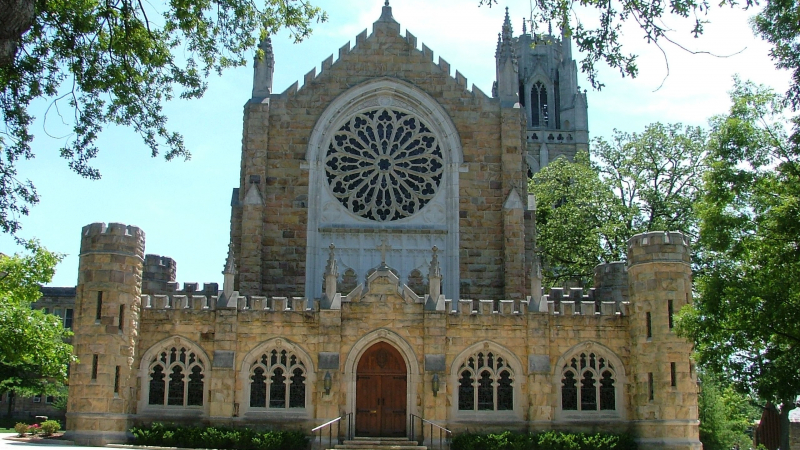Eric Metaxas' Convocation Address

Today, we are sharing a rerun of a post that appears on Eric Metaxas' blog, in 2015 he gave a speech at the Easter Convocation of University of the South in Sewanee, Tennessee, and we hope our families will enjoy reading this as much as we did.
__________
Good morning. I am so honored to have been invited to be here with you this afternoon.
I’m so glad that it was mentioned in my introduction that I wrote for VeggieTales. If you didn’t know that, now you do.
As a visitor to this august institution, I can hardly help but be struck by the tradition that you have here. This is not something that one sees very much and I can hardly tell you how refreshing it is to me to see this. Students in gowns? An honor code? A carillon? I half expected to be wakened this morning by the sound of musket fire. And then to be carried here in a Sedan Chair.
To see such tradition in an environment of liberal education is encouraging to me, and in the few minutes we have here, I wanted to say something about the tradition of liberal education itself.
First of all, liberal education is something most of us take for granted, because like the fish who knows nothing besides water, we in the United States know almost nothing of what we have been so blessed to swim in for all of our lives, which is to say, an environment of freedom that we believe is our natural and God-given state to enjoy.
The idea that there is such a thing as truth, that there can be a place where we can freely debate the big questions and with civility disagree and respect different beliefs is hardly typical in history. Most of the world in previous centuries has not had this. The freedom and the blessing of liberal education is a rare and fragile thing.
So of course because it is a rare and fragile thing, it takes very very little for it to be eroded — and eventually forgotten and swept away. So we must periodically remind ourselves of what we have and of how fragile and precious it is.
I graduated from college in 1984 — which genuinely seems like yesterday to me, just as today will seem like yesterday to you not only tomorrow, when it really will be yesterday, but thirty years in the future. You’ll see. It will seem like a moment. Time is a foreign medium to us. God made us not for time but for eternity. But that’s another story.
But I remember the day I graduated I was blessed to be Class Day speaker, and so my Atlanta friend Chris Hanes and I spoke that day to the gathered thousands on Old Campus in New Haven.
But I remember as we were putting on our gowns we were told by our classmates that we must wear two ribbons, one green and one gold. They signified some sort of protest on our parts. I know one of them was to show our support for divesting our class funds from any companies that were involved in South Africa, which at that time was still under the terrible regime of apartheid. To this day I cannot remember what the other ribbon was meant to signify.
But what I do remember is that there was a vague coercion to wear these ribbons, as if not wearing them meant one was somehow in favor of apartheid and therefore racist. Not to wear them was not an option if you wanted the respect and admiration of your classmates.
One had to have the right beliefs or else be thought a bigot and unworthy of the respect and admiration of one’s peers. So one wore those ribbons and I did wear those ribbons.
But all these years later I am ashamed of myself. Why did I let peer pressure affect me that way? My friend Chris Hanes was an economics major and he was convinced that divesting the class funds from South Africa was in fact a stupid and a harmful thing — and he didn’t wear the ribbon. But I remember another friend commenting on Chris’s views. How dare Chris think that way? Chris was a southerner and probably a bigot, of course. This proved it.
I mention this because this kind of illiberal thinking is even more alive today than it was thirty years ago, and that’s not a good sign for liberal education or for America.
Today the causes might be different, but the rest is roughly the same. Are you wearing that pink ribbon to signify that you deplore violence against women? Shouldn’t you be? Are you wearing that other ribbon to signify you are for gay marriage? Because if you aren’t, we can’t help but wonder about you. Don’t you want to show everyone that you’re tolerant and openminded?
I was on the other side of this thirty years ago. I remember thinking that those who weren’t saying what I thought were the right things were probably bigots or racists. And I remember thinking that it was therefore okay to demonize them. To think of them as somehow less, as backward and as unworthy of my respect or tolerance. Demonizing one’s ideological opponents was very popular then and I know it’s popular now.
So this morning I ask you to ask yourself: do I know and respect people who have different views than I do on the hot button topics of today? Do I have friends who are pro-choice and pro-life? Do I have friends who are for gay marriage and friends who are against gay marriage? Or don’t I think people on the other side of these issues are worthy of my respect? Do I think they must simply be avoided — and perhaps for the good of all even silenced altogether?
We have to allow disagreement and we have to respect those with whom we disagree. This is at the heart of liberal education and it’s at the heart of democracy and freedom.
In France we have recently seen millions show their support for freedom of speech and expression. Not because those cartoons were great art. They were not. In terms of art, they make Thomas Kinkade look like Vincent van Gogh. They were not great art. They are mostly merely sophomoric acts of provocation. But a free society allows sophomoric expressions. It allows and protects all views, including and especially stupid views and foolish things. That’s the point.
Similarly the movie The Interview was not great art. But that’s not the point. A principle was at stake. It’s called free speech. It’s called freedom.
We are standing up for the principle of freedom. Freedom means we are free — free to hold beliefs with which others disagree. Free to hold beliefs that might even be stupid beliefs.
If we do not stand up for those with whom we disagree, we stand for nothing.
Now today it seems to me that there is a particular move afoot on campuses and elsewhere to marginalize and even to demonize voices of traditional and historic Christian faith. That’s one of the big issues of our time.
This is troubling for the reasons I’ve just stated, but it’s even more troubling than that.
Because to think we can have real and enduring freedom and real liberal education without robust voices of faith ignores history. Our American traditions of freedom and social reform cannot be divorced from robust expressions of faith — and I don’t mean privately, I mean in all spheres of society and culture. I mean in the free marketplace of ideas.
There’s a special relationship between freedom and faith in America, and it’s one the Founders understood and put at the heart of all our freedoms intentionally.
We seem to have lost this understanding, so I want to say a word about it. This is the generation that desperately needs to understand this, because we are on the verge of losing this forever. If we cannot reclaim the Founders understanding in this generation, we will probably lose it forever. So no pressure.
Here’s what I mean.
In his book, A Free People’s Suicide, my friend Os Guinness talks about what he calls the Golden Triangle of Freedom. By the say, I can hardly recommend a book more highly: A Free People’s Suicide. But I’d never heard anything about “The Golden Triangle of Freedom.” But every American needs to know about it, because the Founders understood it and because it’s vitally important.
The Golden Triangle is simply this: Freedom requires Virtue. Virtue requires Faith. And Faith in turn requires Freedom.
Let me explain this briefly. Freedom requires Virtue. Freedom means self-government, right? It’s the opposite of tyranny. It’s freedom from tyranny. We don’t need a big and intrusive government — if we can govern ourselves.
But in order for us to govern ourselves, we need to be virtuous. If we steal and pillage and loot, a government has to come in to restore order. But if we govern ourselves, we don’t need anyone to come in and restore order. If we don’t steal, we need fewer police and our taxes go down. That’s the genius of self-government — but it doesn’t work without people who possess virtue. Your honor code here at Sewanee is a beautiful expression of that.
Okay, so freedom requires virtue. And virtue requires faith. Really? Yes, basically. This isn’t to say that people without faith cannot behave virtuously, but when you look at the bigger picture, historically, people who believe in a God behave because they believe it’s the right thing to do, not because they fear the government. People who believe in the God who says “Thou Shalt Not Steal” and “Thou Shalt Not Murder” because they believe that and they don’t need government to enforce it.
Our founders understood this and they were explicit about this. Our republic was made only for a virtuous and moral people. As I say, your honor code is the perfect example of that? It only works if people abide by it voluntarily.
So if freedom requires virtue and virtue requires faith — but then faith in turn requires freedom! That’s right.
My faith cannot flourish if I cannot practice it freely. That was not possible in England or in other places in Europe, so our Founders determined it would be at the heart of American freedom. Freedom of Religion.
Religious Liberty. They understood that this was the genius at the heart of the whole thing. It was the bedrock beneath all the freedoms.
We must have Religious Freedom and we must tolerate and even encourage those voices and that freedom even if and especially if we disagree with them. As I say, this is at the heart of freedom and at the heart of liberal education.
So I say to you, do not dismiss the voices of traditional and historical Christianity. Do not marginalize voices of faith. Do not say we have moved on. Do not say “History has decided and you’d better get on the right side of history.” Such statements are cliches and to stoop to cliches is to silence debate and to be profoundly illiberal and in fact to be intolerant. Surely educated people can see the irony in this?
I was recently asked, Are you for marriage equality? That’s a question like “When did you stop beating your wife?” It’s not designed to open up debate, but to shut it down — and that is dangerous.
Because the implication is that you’re either for it or you’re a bigot, right? And you don’t want to be a bigot, do you? I felt just the way I felt thirty years ago when I was handed those two ribbons to wear on my graduation gown. Ladies and gentlemen, when people are afraid to discuss something openly and freely — and to really hear both sides with civility and tolerance, the beginning of the end of freedom is at hand.
Surely these important issues are unworthy of cliches.
What’s the other hot button issue of today? Abortion, of course! In my book, Miracles, I talk about a friend who had an abortion and who was emotionally devastated by it. She found healing and forgiveness, but my question is: why can’t we hear the stories of women who have not had a positive experience with abortion? Why must we stick to a narrative that denies the voices of those women? Can we not bear the truth that some women’s lives are not helped by the choice to end their babies’ lives? Is that impossible for us to hear?
Why can’t we hear both sides of the story?
Let’s be clear, this is not a left/right issue! My friend Kirsten Powers, who is a Democrat and a liberal, is writing a book about this, titled The Silencing. She is deeply concerned about this. And we should all be concerned.
Silencing opposing voices and views is not healthy or wise.
That warm feeling of approval from my peers thirty years ago went away quickly and now I’m deeply embarrassed by that — by going along with the crowd. Without thinking for myself. Without daring to be honest and open.
We have to question our own beliefs. That is at the heart of liberal education. We have to question our smug assumptions.
If you are a conservative who is unacquainted with why a principled liberal holds the views he does, you should change that. Listen respectfully. You will learn something. You will be blessed.
And if you are a liberal who is unacquainted with why a principled conservative holds the views she does, you should change that. Listen respectfully. You will learn something. You will be blessed.
And if you don’t believe those on the other side can possibly be principled and worthy of your respect and civility, you should be frightened. Because where you are leads to real problems, to the end of liberal education and to the end of freedom.
In closing, let me say that we must remember that the voices of faith in history have sometimes been the only voices on the right side of an issue — when everyone was saying shut up and move along. Remember that Martin Luther King, Jr. and Rosa Parks and Jackie Robinson were motivated by their faith in Jesus of Nazareth.
Remember that William Wilberforce ended the slave trade because of his abiding faith in Jesus of Nazareth. Did you know that those who were devout in their Christian faith generally opposed the Slave Trade? In those days they were derided as Methodists and mocked as enthusiasts. Today we call them evangelicals. And it is because of them practicing their faith throughout public life that slavery ended.
Many excoriated them, telling them to keep their faith private. It was meant to be kept to oneself. But they knew that the enslaved Africans were God’s children and if they did not do something to help them, God would judge them. They knew there was no way to keep their faith private.
Dietrich Bonhoeffer stood up for the Jews because of his faith in the Jew, Jesus of Nazareth. Adolf Hitler knew that if he could get the Christians in Germany to keep their faith private, to keep it in church on Sunday morning, he would have no real opposition. But Bonhoeffer and Martin Niemoller and others knew that if one kept one’s faith private, if one kept one’s faith restricted to Sunday mornings, one had no faith.
If one claimed to be a Christian and did not speak out for the Jews, one was not a Christian, but a hypocrite.
So the story of faith is and must always be the story of faith in public life. We are not to hide our light under a bushel. And if shining our light comes with a price, so be it. We must pay that price and should be glad to pay it, even if, as in the case of Bonhoeffer, that price is our lives. Sometimes the price is facing a cocked gun, and sometimes it is the threat of a cocked eyebrow.
We may have to endure others looking at us as though we were backward and obtuse and even bigoted. But is that really such a great price to pay? What if the God who asks us to do these things gave up his own life for us? Shouldn’t we be willing to give up that warm and temporary feeling of our peers’ approval for him? What if he really died for us?
Well, cutting to the chase, because my time is up, he did. And that mythical and historical act of self-sacrifice has informed history and all human progress ever since.
Finally, I know because this is a Christian institution I needn’t be shy about mentioning Jesus. I can testify that knowing him — the person of Jesus — is why we are here on this planet. His love makes the stars run in their courses, and the electrons run in theirs. It sustains the universe. But here’s the point: he cares more about you — about sustaining you and about knowing you — than about the electrons or the stars. I didn’t want to leave this wonderful place without mentioning that.
Thank you for listening and God bless you and keep you. May He shine the light of His countenance upon you and give you peace.
Amen.
__________
Eric Metaxas is the New York Times#1 bestselling author of Martin Luther, If You Can Keep It, Bonhoeffer, Miracles, Seven Women, Seven Men, and Amazing Grace. He has written more than thirty children’s books, including the bestsellers Squanto and the Miracle of Thanksgiving and It’s Time to Sleep, My Love, illustrated by Nancy Tillman. His books have been translated into more than twenty languages. He is the host of the Eric Metaxas Radio Show, a nationally syndicated radio program heard in more than 120 cities around the U.S.
Metaxas speaks to thousands around the U.S. and internationally each year. He was the keynote speaker at the 2012 National Prayer Breakfast in Washington DC, an event attended by the President and First Lady, the Vice President, members of Congress, and other U.S. and world leaders. Previous keynote speakers have included Mother Theresa, Bono, and Tony Blair. That speech and Eric’s essay on the experience were put into a book, No Pressure, Mr. President: The Power of True Belief in a Time of Crisis.







